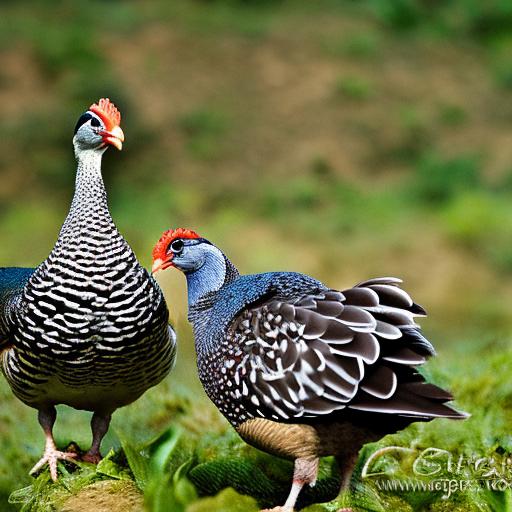Guinea fowl and chickens are both popular poultry birds that are often kept together on farms and in backyard settings. While they have some similarities, such as being domesticated birds and providing eggs and meat, there are also some key differences between the two. Guinea fowl are known for their unique appearance and loud calls, while chickens are more commonly recognized for their variety of breeds and docile nature. Despite these differences, many people choose to keep guinea fowl and chickens together due to the benefits they provide.
Key Takeaways
- Guinea fowl and chickens are both popular domesticated birds for their meat and eggs.
- Guinea fowl are more independent and alert, while chickens are more social and docile.
- Keeping guinea fowl with chickens can help control pests and provide added protection, but may also lead to aggression and competition for resources.
- Guinea fowl and chickens can be compatible if introduced properly and provided with adequate space and resources.
- Feeding and housing requirements for guinea fowl and chickens may differ, so it’s important to research and plan accordingly.
Differences in Behavior and Characteristics of Guinea Fowl and Chickens
Physically, guinea fowl and chickens have distinct differences. Guinea fowl have a more slender body shape with longer legs and necks compared to chickens. They also have a unique feather pattern, with speckled or dotted feathers in various shades of gray, black, and white. Chickens, on the other hand, come in a wide range of colors and feather patterns, depending on the breed.
In terms of behavior, guinea fowl are known for being more active and alert compared to chickens. They are excellent foragers and have a strong instinct for pest control, making them valuable additions to a flock. Guinea fowl are also known for their loud calls, which serve as an alarm system to alert the flock of any potential danger. Chickens, on the other hand, tend to be more docile and less active. They are known for scratching the ground in search of food but may not be as efficient at pest control as guinea fowl.
When kept together, guinea fowl and chickens can interact in various ways. In some cases, they may form mixed flocks where they coexist peacefully. However, there may also be instances where guinea fowl display aggression towards chickens or vice versa. It is important to monitor their interactions closely and provide enough space and resources to prevent any conflicts.
Advantages of Keeping Guinea Fowl with Chickens
One of the main advantages of keeping guinea fowl with chickens is their pest control abilities. Guinea fowl are excellent foragers and have a strong instinct for hunting insects, ticks, and other pests. They can help reduce the population of pests in the area, which can be beneficial for both the birds and their human caretakers. Chickens also contribute to pest control, but guinea fowl are known to be more efficient in this regard.
Another advantage of keeping guinea fowl with chickens is their alarm system. Guinea fowl have a loud and distinctive call that serves as a warning to the flock. They are highly alert and can detect potential threats from a distance. This can help protect the entire flock, including the chickens, from predators such as foxes or hawks. Chickens may not have the same level of vigilance as guinea fowl, making them more vulnerable to attacks.
In addition to their pest control and alarm system abilities, guinea fowl also provide unique eggs. Guinea fowl eggs have a harder shell compared to chicken eggs and have a distinct flavor. Some people prefer the taste of guinea fowl eggs and find them to be a delicacy. By keeping guinea fowl with chickens, you can enjoy a variety of eggs from both species.
Challenges of Keeping Guinea Fowl with Chickens
While there are many advantages to keeping guinea fowl with chickens, there are also some challenges that need to be considered. One of the main challenges is the noise level. Guinea fowl are known for their loud calls, especially during mating season or when they sense danger. This can be disruptive and may not be suitable for those living in urban or densely populated areas. Chickens, on the other hand, tend to be quieter and produce more gentle clucking sounds.
Another challenge is that guinea fowl and chickens have different needs when it comes to housing and care. Guinea fowl are more active and require more space to roam and forage compared to chickens. They also have different roosting preferences, with guinea fowl preferring to roost in trees or on higher structures. This means that the coop and run for guinea fowl and chickens need to be designed to accommodate their specific needs.
Aggression can also be a challenge when keeping guinea fowl with chickens. While some individuals may coexist peacefully, there may be instances where guinea fowl display aggression towards chickens or vice versa. This can result in injuries or stress for the birds. It is important to monitor their interactions closely and provide enough space and resources to prevent any conflicts.
Compatibility of Guinea Fowl and Chickens
The compatibility of guinea fowl and chickens depends on various factors. One factor is the individual personalities of the birds. Some guinea fowl and chickens may get along well and coexist peacefully, while others may display aggression towards each other. It is important to observe their interactions closely before deciding to keep them together.
Another factor is the size of the flock. Larger flocks tend to have a better chance of successful integration compared to smaller flocks. This is because there is less chance of one bird being singled out or bullied by others. It is recommended to introduce new birds gradually and in small groups to minimize any potential conflicts.
The age of the birds can also affect compatibility. Younger birds are generally more adaptable and can adjust to new flock members more easily compared to older birds. Introducing younger guinea fowl and chickens together can increase the chances of successful integration.
Feeding Guinea Fowl and Chickens Together

Guinea fowl and chickens have slightly different dietary needs, but they can be fed together with some adjustments. Guinea fowl are excellent foragers and require a diet that includes a variety of insects, seeds, and greens. They also need a higher protein content compared to chickens. Providing a balanced diet for guinea fowl can be achieved by offering a combination of commercial poultry feed, fresh greens, and insects.
Chickens, on the other hand, have a more varied diet that includes grains, seeds, insects, and kitchen scraps. They can be fed a commercial poultry feed that is suitable for their age and breed. It is important to ensure that both guinea fowl and chickens have access to appropriate food sources to meet their specific dietary needs.
When feeding guinea fowl and chickens together, it is important to provide enough feeding space and resources to prevent any conflicts. This can be achieved by using multiple feeding stations or by scattering the food in different areas to encourage foraging behavior.
Housing Requirements for Guinea Fowl and Chickens
The housing requirements for guinea fowl and chickens are similar in some aspects but differ in others. Both species require a secure coop and run to protect them from predators and provide shelter from the elements. The coop should be well-ventilated and provide enough space for the birds to move around comfortably.
Nesting boxes are essential for both guinea fowl and chickens to lay their eggs. Guinea fowl prefer to lay their eggs on the ground or in secluded areas, while chickens prefer elevated nesting boxes. Providing a combination of ground-level nesting areas and elevated nesting boxes can accommodate the preferences of both species.
Roosting space is also important for both guinea fowl and chickens. Guinea fowl prefer to roost in trees or on higher structures, while chickens prefer roosting bars or perches inside the coop. Providing both options can ensure that all birds have access to suitable roosting spaces.
Health Considerations for Guinea Fowl and Chickens
Both guinea fowl and chickens are susceptible to certain health issues that need to be monitored and addressed. Some common health issues for both species include respiratory infections, parasites, and nutritional deficiencies. It is important to provide a clean and hygienic environment for the birds, as well as a balanced diet to prevent these health issues.
Regular health checks and vaccinations can also help prevent and treat common diseases. Consult with a veterinarian who specializes in poultry to develop a health care plan for your guinea fowl and chickens.
Tips for Introducing Guinea Fowl to a Flock of Chickens
Introducing guinea fowl to an existing flock of chickens should be done gradually to minimize stress and potential conflicts. Here are some tips for a successful introduction:
1. Quarantine: Quarantine the new guinea fowl for a few weeks before introducing them to the existing flock. This will help prevent the spread of any potential diseases.
2. Visual Introduction: Start by allowing the guinea fowl and chickens to see each other without direct contact. This can be done by placing them in separate enclosures next to each other.
3. Controlled Interaction: After a few days of visual introduction, allow the guinea fowl and chickens to have controlled interactions under supervision. This can be done by placing them in a neutral territory where there are no established territories or resources.
4. Monitor Interactions: Observe their interactions closely for any signs of aggression or stress. If any conflicts arise, separate the birds and try again after some time.
5. Gradual Integration: Gradually increase the amount of time the guinea fowl and chickens spend together until they can coexist peacefully. This process may take several weeks or even months, depending on the individual birds.
Is Keeping Guinea Fowl with Chickens Right for You?
Keeping guinea fowl with chickens can be a rewarding experience, but it also comes with its challenges. The advantages of pest control, alarm system, and unique eggs make it an attractive option for many poultry keepers. However, the noise level, different needs, and potential aggression between guinea fowl and chickens need to be considered.
Before deciding to keep guinea fowl with chickens, it is important to assess your specific situation and preferences. Consider factors such as the available space, local regulations, and your tolerance for noise. If you have the resources and willingness to provide for the needs of both species, keeping guinea fowl with chickens can be a beneficial and enjoyable endeavor.
If you’re considering keeping guinea fowl with chickens, it’s important to understand the dynamics between these two bird species. While they can coexist, there are certain factors to consider. For more information on this topic, check out this informative article on Poultry Wizard. It provides valuable insights into the compatibility of guinea fowl and chickens, as well as tips for creating a harmonious living environment for both species. Additionally, if you’re looking for practical solutions for housing your chickens and guinea fowl together, you may find the articles on chicken coop portage and chicken coop interior ideas helpful.
FAQs
What are guinea fowl?
Guinea fowl are a type of domesticated bird that are often kept for their meat, eggs, and pest control abilities. They are native to Africa but have been introduced to other parts of the world.
Can guinea fowl be kept with chickens?
Yes, guinea fowl can be kept with chickens. However, it is important to introduce them slowly and monitor their interactions to ensure that they get along. Guinea fowl can be more aggressive than chickens and may bully them if they feel threatened.
What are the benefits of keeping guinea fowl with chickens?
Keeping guinea fowl with chickens can provide several benefits. Guinea fowl are excellent at controlling pests such as ticks, flies, and other insects. They are also good at alerting the flock to potential danger, as they are very vocal and will make loud calls if they sense a predator.
What are the potential drawbacks of keeping guinea fowl with chickens?
One potential drawback of keeping guinea fowl with chickens is that they can be noisy. Guinea fowl are known for their loud calls, which can be disruptive to neighbors. Additionally, guinea fowl may be more aggressive than chickens and may bully them if they feel threatened.
How should guinea fowl be introduced to a flock of chickens?
Guinea fowl should be introduced to a flock of chickens slowly and carefully. It is best to keep them separated at first and gradually introduce them over a period of several weeks. This will give the birds time to get used to each other and establish a pecking order.
What should be considered before keeping guinea fowl with chickens?
Before keeping guinea fowl with chickens, it is important to consider several factors. These include the size of the coop and run, the temperament of the birds, and the availability of food and water. It is also important to check local regulations to ensure that keeping guinea fowl is allowed in your area.
Meet Walter, the feathered-friend fanatic of Florida! Nestled in the sunshine state, Walter struts through life with his feathered companions, clucking his way to happiness. With a coop that’s fancier than a five-star hotel, he’s the Don Juan of the chicken world. When he’s not teaching his hens to do the cha-cha, you’ll find him in a heated debate with his prized rooster, Sir Clucks-a-Lot. Walter’s poultry passion is no yolk; he’s the sunny-side-up guy you never knew you needed in your flock of friends!







